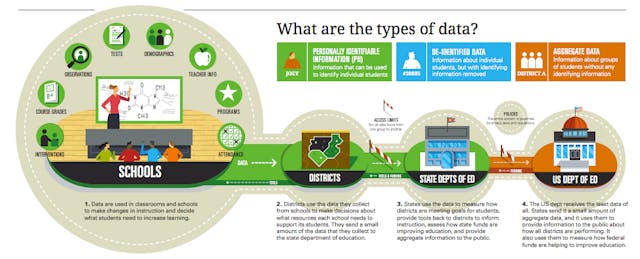The issue of data privacy touches a nerve for many, triggering visions of an internet-era Big Brother beyond Orwell’s wildest predictions. And no privacy issue raises an emotional response—or requires a thoughtful approach—more than the sensitive information compiled about America’s kids.
Last Monday, at a private roundtable hosted by data platform company Clever and digital safety nonprofit iKeepSafe, over 300 representatives from technology companies, nonprofit organizations, and four school districts across the nation came together to share perspectives on student data privacy. The roundtable afforded these individuals, all with a vested interest in the safe use of technology in schools, an opportunity to address concerns. “It’s not often that you have all those constituents in the same room,” said Tyler Bosmeny, CEO of Clever.
Hearing the school district perspective was especially valuable. “We wanted the tech industry to hear from the districts about where their pressure points are, in a very unfiltered way,” explained Marsali Hancock, founding president of iKeepSafe. And, according to her, some of those unfiltered thoughts were surprising to the industry.
“Educators want an increased voice in innovation, and increased transparency about who has access to the data,” said Hancock. Districts called for more ways to easily communicate with companies and with parents. “They’re looking for good ways to explain to parents what they’re doing with student data, and why they’re doing it.”
All four districts also spoke to the challenges posed by increased technology use in the classroom. “One of the districts has 150 different apps used in their district,” explained Bosmeny. “That’s 150 privacy policies to review, 150 integrations to test, 150 security reviews to be done.” Bosmeny sees this as a chance for industry to directly engage with the concerns of districts. “There’s no universal set of regulations, so there’s a big opportunity for people in the industry to step up and work with schools to create solutions.”
Both Bosmeny and Hancock believe that addressing student data privacy requires collaboration. “You have industry on one side and schools on the other—sometimes people see them in opposition, but they’re really not,” said Bosmeny. “There are a lot of folks in industry who really want to see improvements and transparency around the issue of student privacy. And it’s become very clear to everybody over the past six months that we have to up our game on student data privacy. It’s no longer enough to just do the bare minimum—people expect more.”
In recent months, student data privacy has become an increasingly hot-button issue. Aimee Guidera is the Executive Director of Data Quality Campaign (DQC), a nonpartisan national advocacy nonprofit represented at the roundtable. DQC aims to build productive conversations around how data is used in education to improve student achievement. As she sees it, the recent focus on student data privacy largely is due to more technology use and data in the classroom.
A productive conversation about student data privacy must begin with clear information, according to DQC. Without it, the dialogue can devolve into situations akin to the story of inBloom. “Parents didn’t understand how data collection was going to help their child, so all they were hearing were the risks and the scary things about big data,” explained Guidera. “To be honest, there was a lot of fear-mongering and misinformation out there,” contributing to the virulent backlash against inBloom’s collection of student data.
Hancock agreed. “Much of the legislator initiatives [addressing student data privacy] are driven by fear, because people want to protect childhood. To reduce those fears, people need to understand who has the data and what they’re doing with it.” To enable constructive uses of student data, individuals must be able to trust how the collected information will be used. “If it’s done well, then childhood will be protected,” explained Hancock. “If it’s not done well, then innovation and opportunities are lost.”
Encouragingly, according to Bosmeny, times are changing. “The conversations I’m part of today feel much more actionable than the conversations of a few years ago. Now, there’s a lot more urgency to up our game as an industry.”
Both Bosmeny and Hancock envision Monday’s conversation as one that will continue as use of technology and student data grows. “We’re never going to be done addressing the concerns that parents have,” explained Guidera, “because parents and citizens and teachers won’t let data be used if they don’t trust it will help their kids.”
To learn more about student data privacy, check out the resources section of DQC’s website, including a roadmap to safeguarding student data and suggestions of what every parent should be asking about data in education.


